19 Best AI Courses for Systems Analysts to Future-Proof Your Career in 2025
Discover top AI courses tailored for systems analysts to boost your career in 2025. Learn cutting-edge skills, stay ahead in tech, and ensure your expertise remains in demand. Perfect for those ready to embrace AI's transformative power in their professional journey.

The integration of artificial intelligence (AI) into various business domains is accelerating, creating an urgent need for professionals to upskill and adapt. For Systems Analysts, who are pivotal in analyzing and designing information systems, the rise of AI represents both a challenge and an opportunity. As AI technologies continue to permeate the industry, understanding and leveraging these tools is crucial for maintaining a competitive edge and ensuring career longevity. This article presents a curated selection of AI courses designed specifically for Systems Analysts, equipping them with the knowledge to thrive in an increasingly AI-driven work environment.
Why AI Matters for Systems Analysts Today
AI is transforming industries across the globe, with 69% of businesses now utilizing AI technologies to enhance their operations. For Systems Analysts, staying abreast of these developments is vital. AI's ability to process vast amounts of data, automate routine tasks, and facilitate more informed decision-making is invaluable in the field. The purpose of this article is to help Systems Analysts identify the most suitable AI courses that can empower them to integrate AI into their analysis, design, and optimization tasks efficiently.
The Growing Role of AI in Systems Analysts
AI applications are becoming integral to the work of Systems Analysts. Automation of repetitive tasks allows for more focus on complex problem-solving and strategic planning. Enhanced decision-making through AI-driven insights enables analysts to propose more effective solutions. Personalization of user experiences through AI tools helps in crafting systems that better meet end-user needs. These applications illustrate how AI is reshaping traditional workflows and tasks within the Systems Analysts space, demanding a new set of skills and understanding.
Benefits of Becoming an AI Expert in Systems Analysts
For Systems Analysts, becoming proficient in AI offers several benefits. It enhances their ability to provide innovative solutions that align with business goals, improving efficiency and effectiveness. By understanding AI, analysts can better anticipate and respond to changes in technology and business processes. This expertise also opens up new career opportunities, as companies increasingly seek professionals who can bridge the gap between technology and business strategy. Furthermore, AI proficiency can lead to improved job satisfaction as analysts engage in more strategic and impactful work.
This article will compare 19 AI courses in this field, including the CompleteAI Training, which offers a comprehensive library of over 100 specialized video courses and certifications. Designed specifically for Systems Analysts, these courses provide essential AI education, regular updates on the latest AI tools, and industry news that is particularly relevant to Systems Analysts professionals. CompleteAI's courses are highly rated for their extensive offerings and affordable pricing, making them a valuable resource for anyone looking to enhance their AI capabilities.

Comparison: All AI Courses for Systems Analysts (Updated Q2' 2025)
| Course Name | Provider | Price | Key Topics | Pros | Cons | Best For |
|---|---|---|---|---|---|---|
| Complete AI Training Courses for Systems Analysts | CompleteAI | $29/month or $8.25/month billed annually | AI for Systems Analysts, Video Courses, Certifications | Highest rating, Extensive range of AI courses, Daily updates, Affordable pricing | Subscription based | Systems Analysts professionals |
| Artificial Intelligence Nanodegree Program | Udacity | $148.50/month or $504.90 total for 4-month bundle | Optimization algorithms, Bayesian networks, Strategic decision-making | Industry-expert instructors, Hands-on projects, Well-rated | Requires Python knowledge, Cost may be high | General learners |
| AI For Everyone | DeepLearning.AI (Coursera) | $49/month | AI concepts, Business integration | No prerequisites, Accessible, Focus on AI literacy | Not technical, Limited programming depth | General learners |
| LangChain - Develop LLM Powered Applications | Udemy | $12.99 | LLM applications, Python programming | Affordable, Practical focus, Updated content | Requires Python experience, Specialized topic | General learners |
| Big Data, Artificial Intelligence and Ethics | University of California, Davis (Coursera) | Free to audit; $49 for certificate | Big data, AI fundamentals, Ethics | Free option, Ethical focus, Practical IBM Watson experience | Short duration, Introductory level | General learners |
| CS50’s Introduction to Artificial Intelligence with Python | Harvard University | Free to audit; $299 for certificate | AI fundamentals, Machine learning, Python | High-quality instruction, Practical projects | Time-intensive, Intermediate difficulty | General learners |
| Certificate in Artificial Intelligence and Machine Learning | California Institute of Applied Technology (CIAT) | Varies (typically $2,000-$4,000) | AI labs, Industry frameworks | Focus on enterprise roles, Live instruction, Practical labs | Requires prior IT experience, Variable pricing | General learners |
| Certificate Program in AI Business Strategy | Johns Hopkins University | $2,600 | AI business strategy, Masterclasses | Executive-level focus, Mentorship, Practical strategy application | High cost, Targeted at business leadership roles | General learners |
| AI for Business Specialization | University of Pennsylvania (Wharton) via Coursera | $79 for full 4-month specialization | AI applications in business, Machine learning, Big data | Business-focused, Affordable, Expert faculty | 2 hours/week commitment, Some technical content | General learners |
| Computer Science for Artificial Intelligence Professional Certificate | Harvard University (edX) | Free to audit; $348 for certificate | CS fundamentals, AI concepts | Strong CS foundation, High-quality instruction, Free auditing | Demanding workload, Challenging for novices | General learners |
Understanding AI Training for Systems Analysts Professionals
Systems Analysts are increasingly finding AI integration essential for enhancing efficiency and strategic decision-making. With an array of AI courses available, professionals need to choose programs that align with their career goals and expertise level. This article provides a comprehensive comparison of AI courses tailored for Systems Analysts, ensuring informed decisions for continuous learning.
Course 1: CompleteAI Training
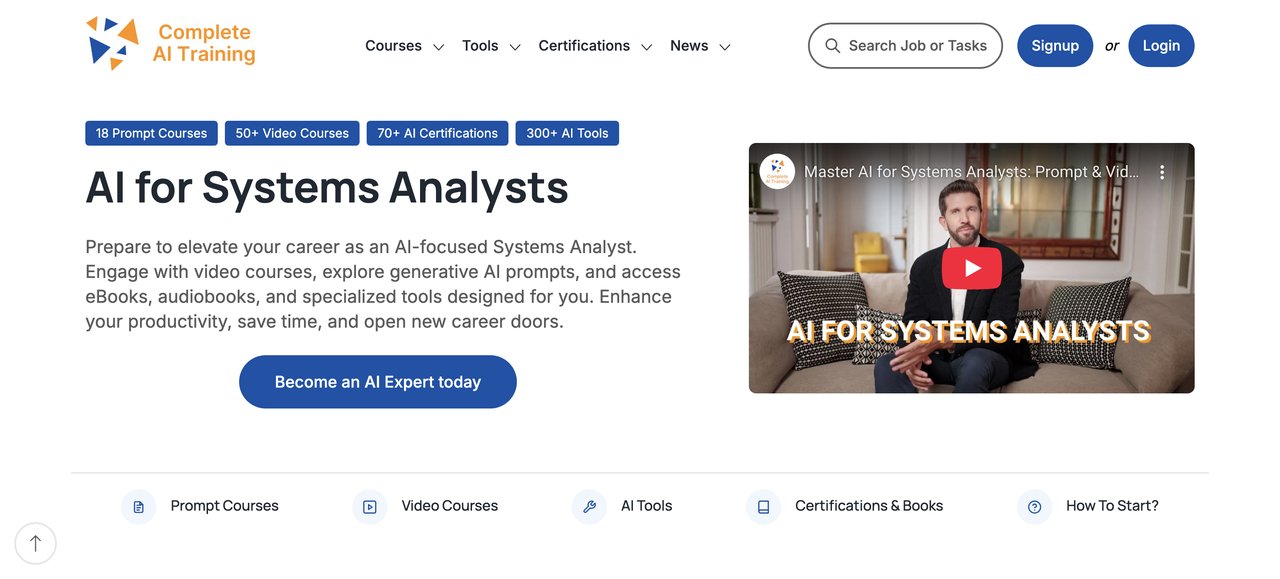
Complete AI Training offers a comprehensive suite of over 100 video courses and certifications specifically designed for Systems Analysts. From AI fundamentals to advanced integration techniques, subscribers gain access to continuously updated resources. This program emphasizes practical application, ensuring learners stay current with AI advancements. The course includes daily updates on AI tools and industry news, facilitating real-world application in system analysis.
Key topics include AI tools, data modeling, system requirements analysis, process improvement, and system integration planning. Suitable for beginners to advanced learners, the course requires a subscription for access.
- Pros:
- Extensive range of AI courses tailored for Systems Analysts
- Daily updates on AI tools and industry news
- Affordable pricing, especially with annual billing
- Highest rating in this category
- Cons:
- Requires ongoing subscription for continuous learning
Visit CompleteAI Training for more information
Best for Systems Analysts seeking a comprehensive, up-to-date AI education with practical applications.
Course 2: AI & ChatGPT for System Requirements Analysis (Updated 2025)
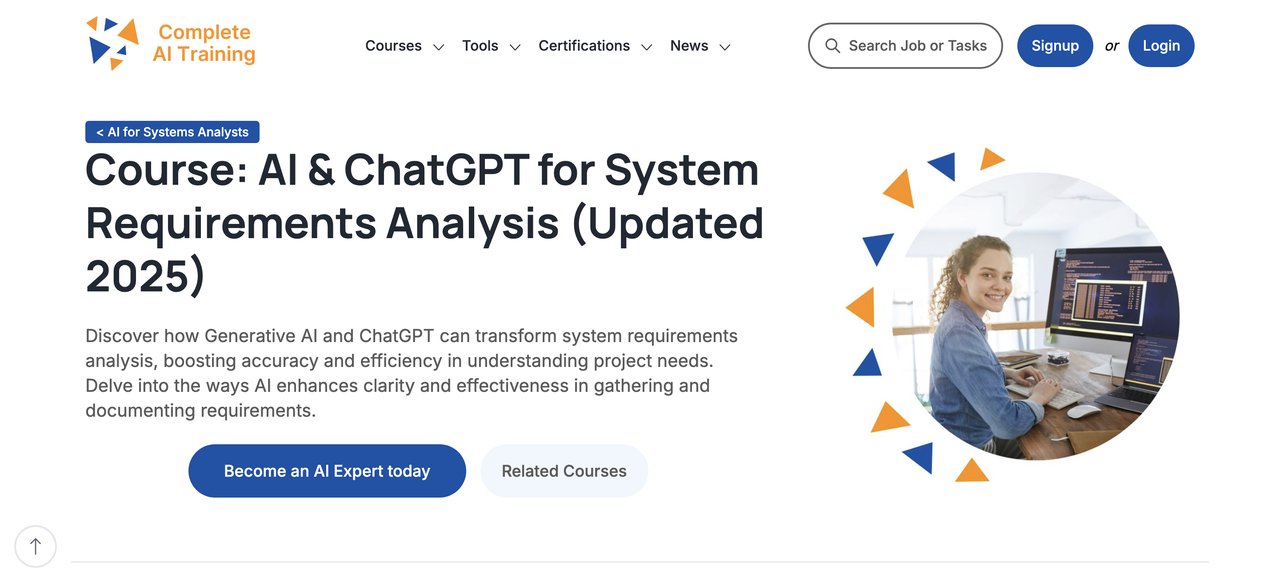
This course by Complete AI Training focuses on utilizing AI and ChatGPT to enhance system requirements analysis. It's designed to improve accuracy and efficiency, making it ideal for Systems Analysts involved in detailed requirement gathering and analysis. Updated content ensures learners are equipped with the latest techniques.
Key topics include AI applications in requirement analysis and leveraging ChatGPT for efficiency improvements. Suitable for beginners, this course is part of the broader Complete AI Training subscription.
- Pros:
- Tailored content for Systems Analysts
- Updated for 2025
- Practical and actionable insights
- Cons:
- Requires subscription for access
Ideal for Systems Analysts focusing on improving requirement analysis accuracy and efficiency.
Course 3: AI & ChatGPT for Process Improvement (Updated 2025)
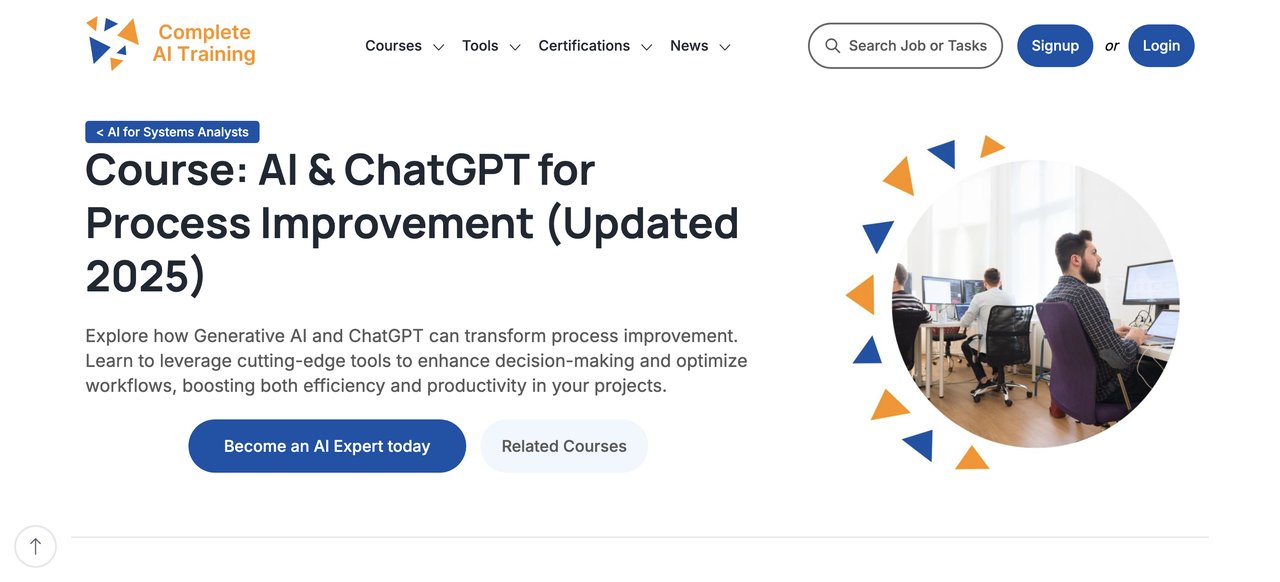
This beginner course teaches Systems Analysts how to use AI tools for business process improvement. The focus is on identifying inefficiencies and streamlining workflows, making it a practical choice for those aiming to increase operational efficiency within their organizations.
Key topics include AI-driven process enhancements and workflow optimization. The course is updated regularly to reflect the latest trends and is available through subscription.
- Pros:
- Practical focus on process improvement
- Content updated for 2025
- Cons:
- No standalone price; part of broader subscription
Recommended for Systems Analysts looking to optimize business processes using AI.
Course 4: AI & ChatGPT for Data Modeling (Updated 2025)
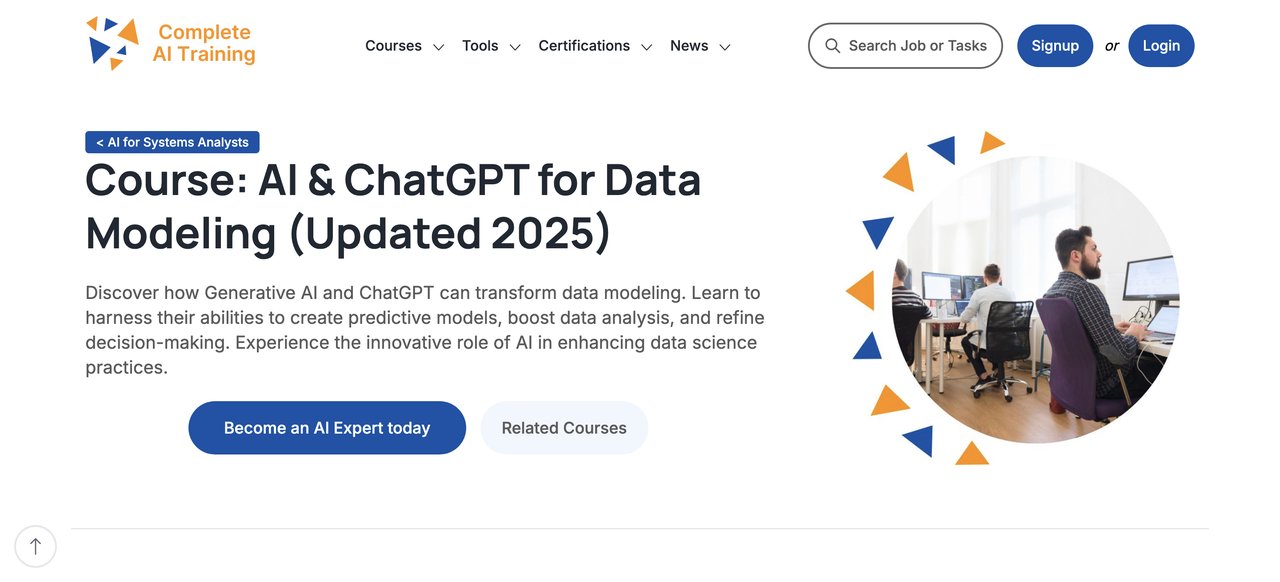
This course focuses on applying AI and ChatGPT to enhance data modeling tasks. Systems Analysts will learn to create more accurate and efficient data models, essential for informed decision-making and system design.
Key topics include AI techniques in data modeling and practical applications of ChatGPT. Suitable for beginners, the course requires a subscription for access.
- Pros:
- Role-specific content
- Regularly updated
- Cons:
- Pricing details not transparent
Best suited for Systems Analysts focusing on data-driven decision-making and model improvement.
Course 5: AI & ChatGPT for Performance Analysis (Updated 2025)
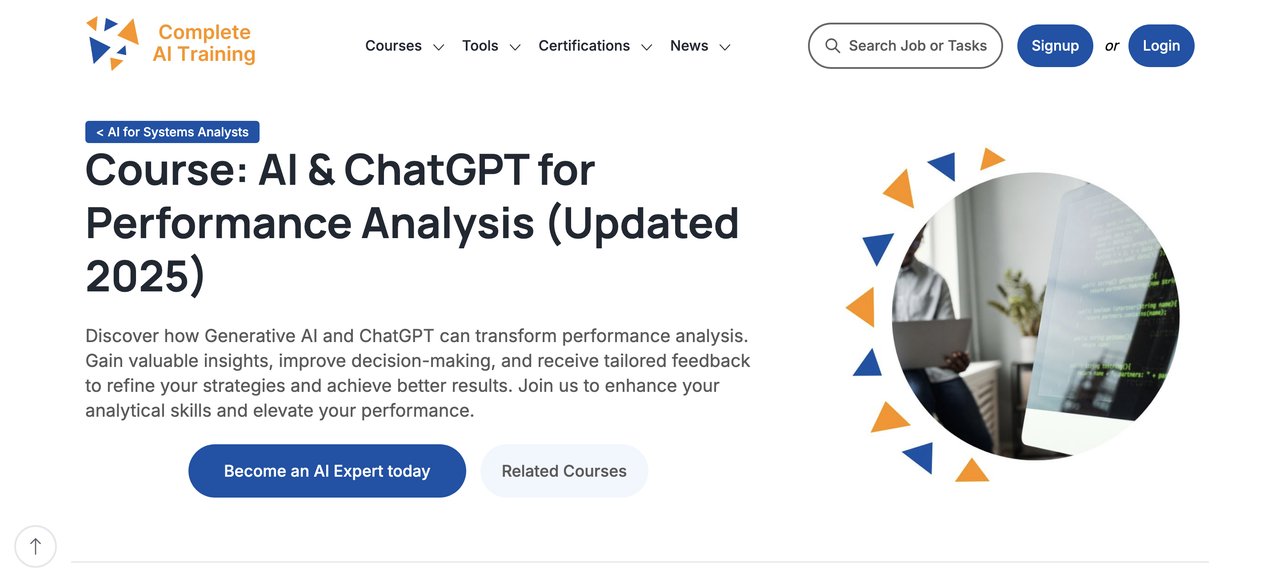
This course teaches Systems Analysts how to utilize AI for analyzing system and process performance. Learners will gain skills in identifying bottlenecks and optimizing system outcomes, crucial for maintaining high efficiency.
Key topics include performance analysis techniques and AI-driven optimization. The course is updated yearly and requires a subscription for access.
- Pros:
- Practical focus on performance optimization
- Updated for current AI trends
- Cons:
- Subscription required; no individual pricing
Perfect for Systems Analysts aiming to improve system performance through AI.
Course 6: AI & ChatGPT for User Interface Design (Updated 2025)

This course focuses on AI applications in user interface design. Systems Analysts will learn how AI can enhance user experience through AI-driven insights and automation, making interfaces more intuitive and efficient.
Key topics include AI-enhanced UI design and user experience optimization. The course requires a subscription for access.
- Pros:
- Tailored for Systems Analysts
- Practical applications in UI design
- Cons:
- Pricing bundled in subscription
Best for Systems Analysts involved in designing user interfaces with AI insights.
Course 7: AI & ChatGPT for System Integration Planning (Updated 2025)
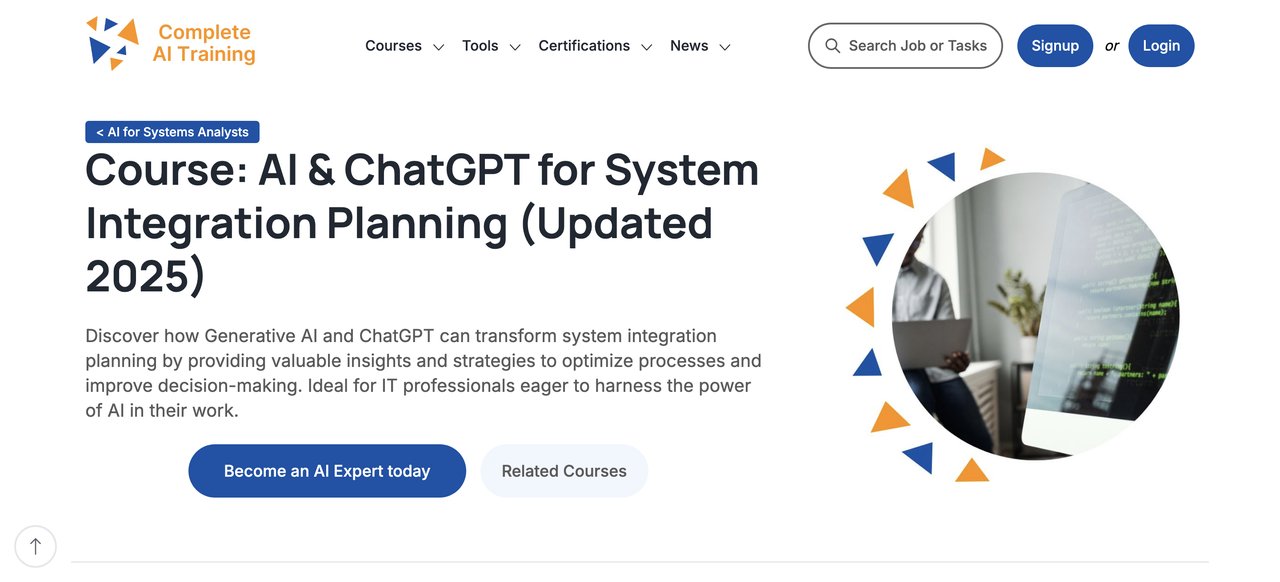
This course covers AI applications in planning system integrations, enabling Systems Analysts to streamline integration projects and reduce errors. Learners gain insights into AI-driven planning techniques to ensure seamless integration processes.
Key topics include integration planning and AI strategies for error reduction. The course is available as part of the Complete AI Training subscription.
- Pros:
- Specific to integration planning
- Updated content
- Cons:
- Access via subscription
Ideal for Systems Analysts focused on improving system integration efficiency.
Course 8: Artificial Intelligence Nanodegree Program by Udacity
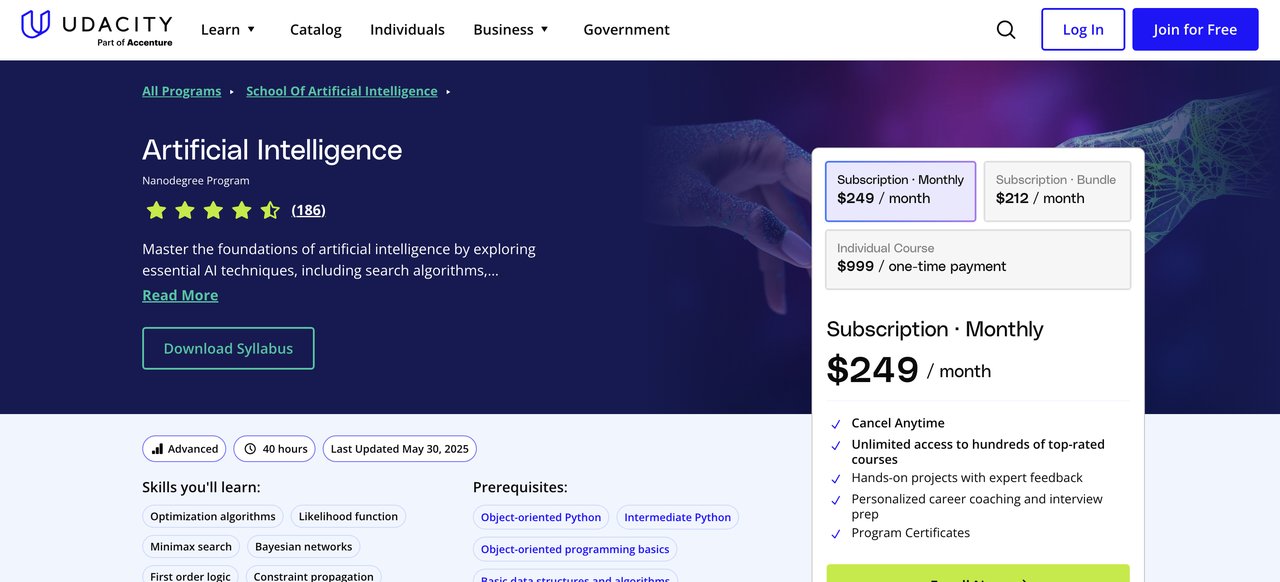
The Artificial Intelligence Nanodegree Program by Udacity is a comprehensive course covering essential AI concepts like optimization algorithms and Bayesian networks. Taught by industry experts, it includes hands-on projects that teach practical AI applications.
Key topics include AI optimization, strategic decision-making, and hands-on projects. This program is best suited for learners with prior Python knowledge.
- Pros:
- Industry-expert instructors
- Hands-on projects
- Well-rated (4.5/5 stars)
- Cons:
- Requires prior Python knowledge
- Higher cost
Best for Systems Analysts with a technical background looking to deepen their AI expertise.
Course 9: AI For Everyone by DeepLearning.AI (Coursera)

AI For Everyone by DeepLearning.AI on Coursera offers a non-technical introduction to AI concepts. Created for beginners and non-technical professionals, it helps Systems Analysts understand AI's business applications without requiring programming skills.
Key topics include AI integration in business and AI capabilities overview. The course is accessible without prerequisites.
- Pros:
- No prerequisites needed
- Focus on AI literacy and business integration
- Taught by Andrew Ng
- Cons:
- Not technical
- Limited programming or math depth
Suitable for Systems Analysts seeking a foundational understanding of AI in business contexts.
Course 10: LangChain - Develop LLM Powered Applications with LangChain by Udemy

This Udemy course focuses on building real-world large language model applications using LangChain. It's practical for Systems Analysts with Python experience who want to develop LLM-powered applications.
Key topics include prompt engineering, ReAct agents, and retrieval augmented generation (RAG). The course offers lifetime access for a one-time fee.
- Pros:
- Affordable
- Practical focus on LLM apps
- Updated content
- Cons:
- Requires Python experience
- Specialized topic
Ideal for Systems Analysts interested in hands-on experience with language model applications.
Course 11: Big Data, Artificial Intelligence and Ethics by University of California, Davis (Coursera)

This beginner-level course covers big data, AI fundamentals, IBM Watson NLP tools, and ethical considerations. It's suitable for those new to AI, offering a flexible, self-paced learning experience.
Key topics include AI ethics and practical IBM Watson experience. The course is free to audit with a paid certificate option.
- Pros:
- Free option available
- Ethical focus
- Practical IBM Watson experience
- Cons:
- Short duration
- Introductory level only
Perfect for Systems Analysts interested in AI ethics and big data insights.
Course 12: CS50’s Introduction to Artificial Intelligence with Python by Harvard University
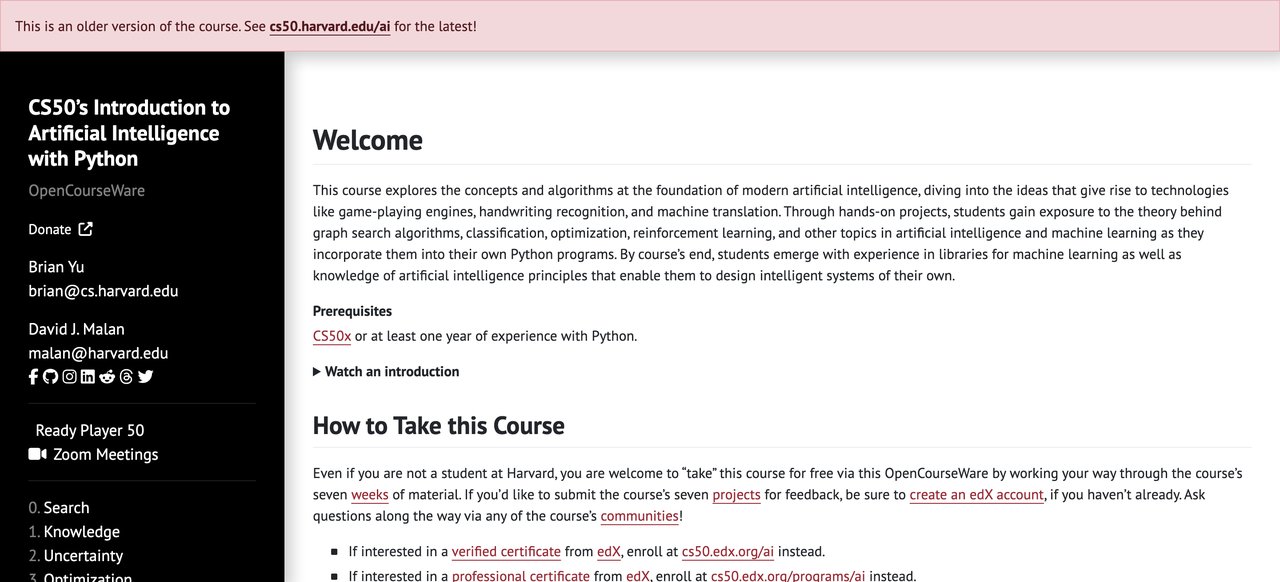
This intermediate course provides an in-depth introduction to AI and machine learning using Python. Topics include graph search, reinforcement learning, and practical AI projects, making it ideal for learners with a programming background.
Key topics include game-playing engines and handwriting recognition projects. The course is free to audit, with a certificate option.
- Pros:
- High-quality Harvard instruction
- Practical coding projects
- Cons:
- Time-intensive
- Intermediate difficulty
Recommended for Systems Analysts with programming skills seeking advanced AI understanding.
Course 13: Certificate in Artificial Intelligence and Machine Learning by California Institute of Applied Technology (CIAT)
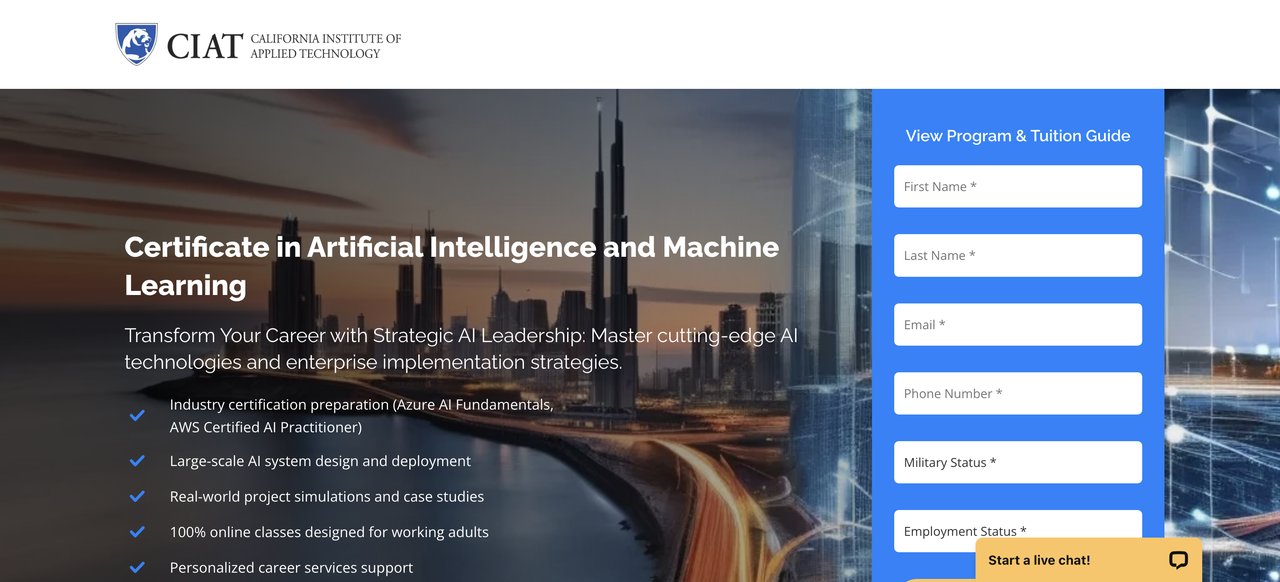
This certificate program prepares learners for senior roles in AI, such as Machine Learning Engineer or AI Solutions Architect. It includes practical labs and training on popular industry frameworks.
Key topics include enterprise AI roles and practical AI labs. The course duration is 4 to 10 months, with live instructor-led online classes.
- Pros:
- Focus on enterprise AI roles
- Live instruction
- Practical labs
- Cons:
- Requires significant prior IT experience
- Variable pricing
Best for Systems Analysts aiming for senior AI roles and practical experience.
Course 14: Certificate Program in AI Business Strategy by Johns Hopkins University
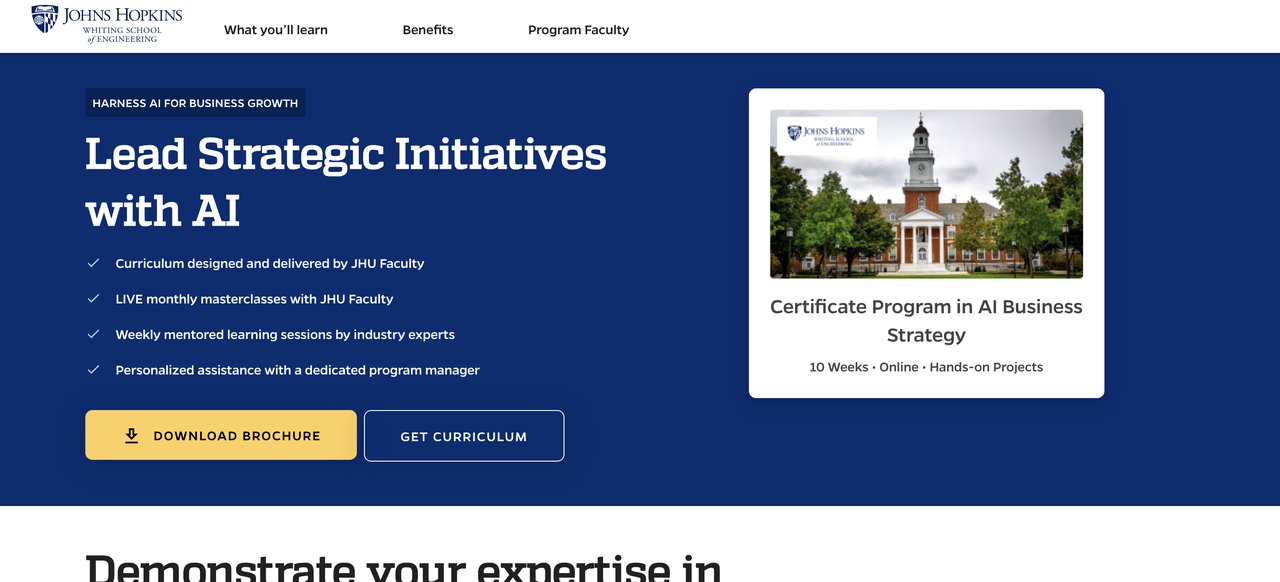
This 10-week online course is designed for project managers, consultants, and executives to develop AI business strategy skills. It includes live masterclasses, mentored sessions, and hands-on projects.
Key topics include AI business strategy and practical strategy application. The course targets business leadership roles.
- Pros:
- Executive-level focus
- Mentorship
- Practical strategy application
- Cons:
- High cost
- Targeted at business leadership roles
Ideal for Systems Analysts in leadership roles seeking AI business strategy skills.
Course 15: AI for Business Specialization by University of Pennsylvania (Wharton) via Coursera

This business-focused program covers AI, machine learning, and big data applications in marketing, finance, and HR. It includes ethical AI strategies and practical tools like TensorFlow and AutoML.
Key topics include business AI applications and data analytics. The course requires a commitment of 2 hours per week.
- Pros:
- Business-focused AI application
- Affordable
- Expert faculty
- Cons:
- Requires 2 hours/week commitment
- Some technical content
Best for Systems Analysts focusing on AI applications in business sectors.
Course 16: Computer Science for Artificial Intelligence Professional Certificate by Harvard University (edX)

This five-month professional certificate program covers computer science fundamentals and AI concepts. It involves challenging problem sets and projects, such as tic-tac-toe, crossword puzzles, and NLP tasks.
Key topics include AI development and CS fundamentals. The course is free to audit with a paid certificate option.
- Pros:
- Strong CS foundation essential for AI development
- High-quality instruction and active community
- Free auditing option available
- Cons:
- Demanding workload
- May be challenging for those without prior programming experience
Iideal for Systems Analysts seeking a strong foundation in AI and computer science.
Course 17: Large Language Models Professional Certificate by Databricks (edX)
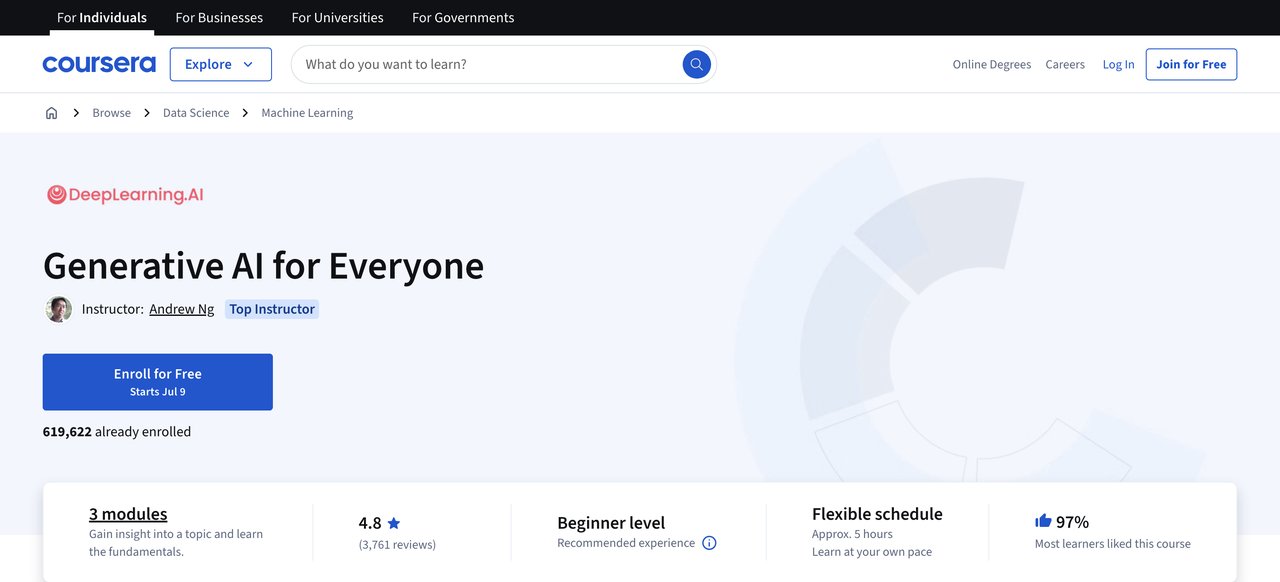
This three-week course covers how LLMs work, their applications, and how to build projects using Python and PyTorch. Topics include transformer architectures, prompt engineering, and fine-tuning.
Key topics include LLM concepts and societal impacts. The course requires prior machine learning knowledge.
- Pros:
- Comprehensive coverage of LLM concepts and coding
- Taught by experts with PhDs in ML
- Includes societal and operational considerations
- Cons:
- Requires prior machine learning knowledge
- Short duration may be intense
Best for Systems Analysts with ML experience looking to specialize in LLM applications.
Course 18: Deep Learning Specialization by DeepLearning.AI (Coursera)

This intermediate specialization focuses on deep neural networks, computer vision, and NLP. It provides mathematical understanding and hands-on coding projects, essential for understanding AI’s core technologies.
Key topics include deep learning and neural networks. The course requires Python and math prerequisites.
- Pros:
- Taught by Andrew Ng and Stanford instructors
- Strong theoretical and practical balance
- Covers key AI subfields
- Cons:
- Requires Python and math prerequisites
- Monthly subscription pricing
Ideal for Systems Analysts with a solid math background wanting to delve into deep learning.
Course 19: Artificial Intelligence (MIT OpenCourseWare) by MIT OpenCourseWare

This free, academic-style course from MIT covers classical AI algorithms, reasoning, search, constraints, machine learning basics, and AI architectures. It offers a rigorous introduction to AI fundamentals.
Key topics include classical AI algorithms and neural networks. The course is self-paced and free.
- Pros:
- Free and comprehensive
- High-quality MIT instruction
- Covers broad AI topics
- Cons:
- Self-paced without interactive support
- Older course (2010), less focus on recent AI advances
Perfect for Systems Analysts interested in an academic understanding of AI.
Overall Recommendations for Systems Analysts
When choosing an AI course, Systems Analysts should consider their career goals, existing skills, and the practical application of course content. For those seeking comprehensive, up-to-date training, CompleteAI Training offers the most tailored and affordable option. However, for more specialized needs—such as understanding AI ethics or focusing on business strategy—other courses like the AI For Everyone by DeepLearning.AI or the Certificate Program in AI Business Strategy by Johns Hopkins University might be more appropriate.
Ultimately, the best course will align with your professional aspirations and provide practical skills applicable to real-world scenarios. Whether you're new to AI or an experienced analyst, the right course can significantly enhance your capabilities and career trajectory.




